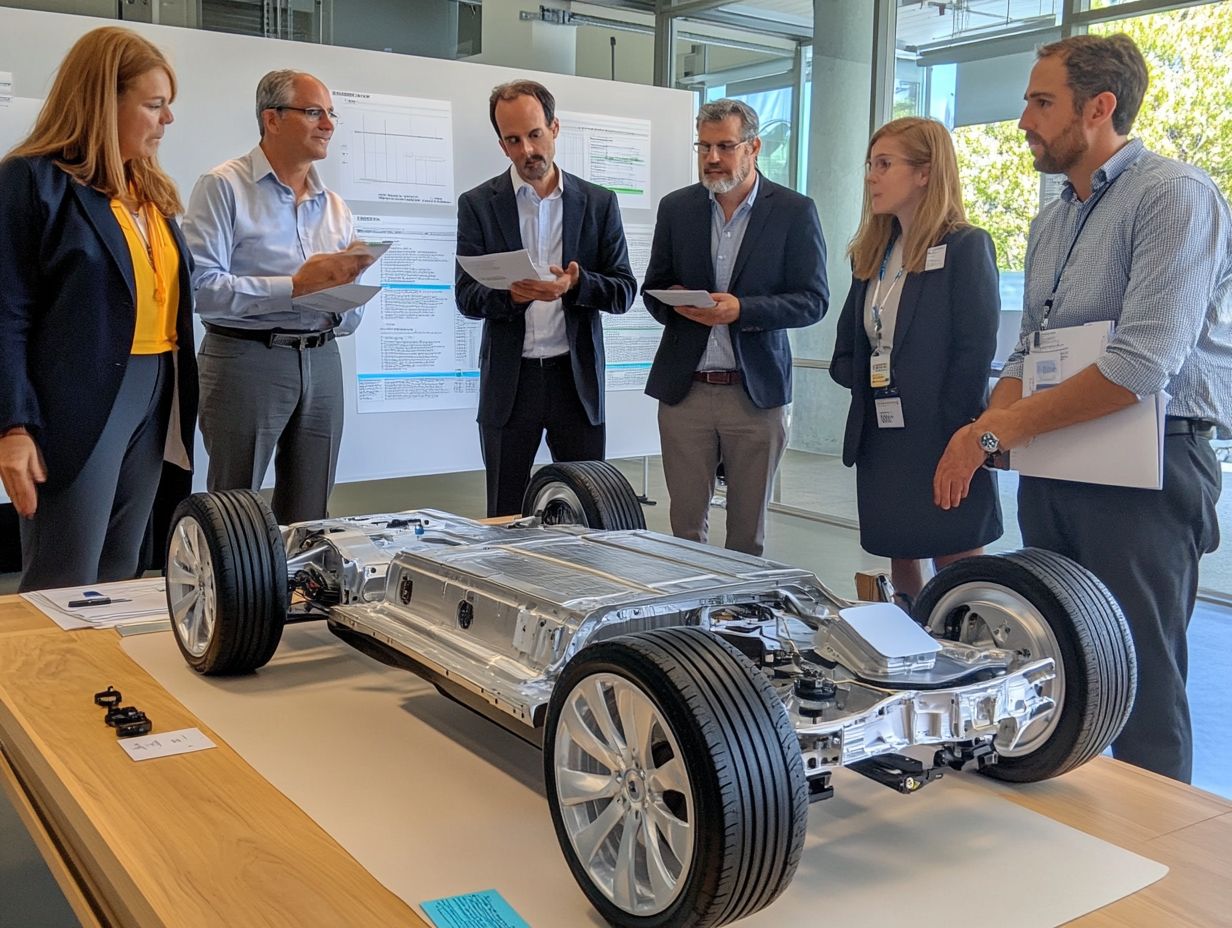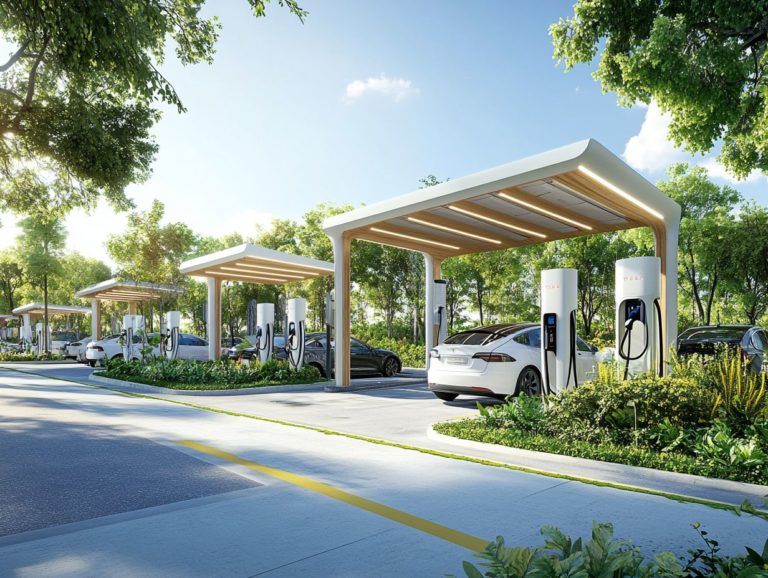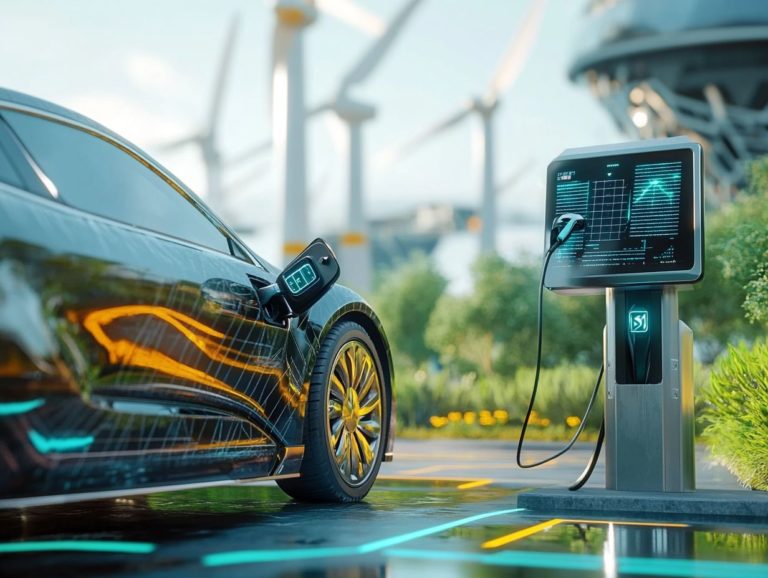The Importance of EV Partnerships and Collaborations
As you delve into the rapidly expanding electric vehicle (EV) market, you’ll find that partnerships are emerging as a pivotal force behind innovation and growth.
Collaborations among manufacturers, suppliers, and technology firms enhance product development and optimize costs.
Get ready to explore the exciting world of EV partnerships! Discover how they are reshaping the future of transportation.
Contents
- Key Takeaways:
- The Rise of Electric Vehicles
- Benefits of Partnerships in the EV Industry
- Types of EV Partnerships
- Successful EV Partnerships
- Challenges and Considerations
- Frequently Asked Questions
- What is the importance of EV partnerships and collaborations?
- How do EV partnerships and collaborations benefit the industry?
- What types of companies and organizations are involved in EV partnerships and collaborations?
- What are some examples of successful EV partnerships and collaborations?
- Why are EV partnerships and collaborations important for the environment?
- How can consumers benefit from EV partnerships and collaborations?
Key Takeaways:

The Rise of Electric Vehicles
The rise of electric vehicles (EVs) marks a remarkable transformation in the automotive industry. This shift is driven by advanced EV technology, strong regulations, and growing awareness of sustainability challenges.
As cities and governments worldwide emphasize sustainable transportation, demand for electric engines and innovative battery technology is soaring. Ford, Volkswagen, and Toyota are leading the way.
The development of a robust network of charging stations is essential for the acceptance of EVs. Government incentives encourage consumers to switch from conventional vehicles to electric options.
Overview of the EV Market and Growth
The electric vehicle market is experiencing remarkable growth due to advancements in EV technology and a strong commitment to sustainability within the automotive sector.
This dynamic industry boasts an annual growth rate exceeding 20%. Major players like Tesla, Ford, and Volkswagen contribute significantly to this growth, particularly in California, where nearly 50% of the nation s electric vehicle sales occur.
Public-private partnerships, especially between automakers and charging station providers, have played a vital role in this expansion. Generous government incentives, like tax rebates and grants, have made electric vehicles more accessible.
Benefits of Partnerships in the EV Industry
Partnerships are crucial in the EV industry. They create collaboration that drives innovation, refines EV technology, and addresses sustainability challenges facing the automotive sector.
Collaborating for Innovation and Growth
Collaboration is vital in the EV industry, allowing companies to share expertise and drive advancements in EV technology.
This spirit of teamwork shines in various research partnerships where tech companies join forces with academic institutions and manufacturers to create groundbreaking solutions. For instance, a recent alliance between a major automaker and a leading university achieved significant improvements in battery performance.
The development of talent within these collaborations nurtures creativity and innovation. By fostering cross-industry collaboration, companies build a skilled workforce ready to tackle current challenges and anticipate future needs.
Cost and Resource Sharing

Cost and resource sharing among EV partnerships significantly lightens the financial load tied to developing new technologies and tackling sustainability challenges.
By pooling resources and expertise, companies can distribute costs effectively. This approach helps address complex problems with greater efficiency. Take, for instance, the collaborations between automotive giants and battery manufacturers; these partnerships have led to groundbreaking innovations in energy storage technology.
Consider the alliance between Ford and Rivian, which enhances vehicle offerings while streamlining shared technologies to reduce operational costs. Such strategic partnerships enable companies to overcome financial hurdles while promoting greater sustainability. Ultimately, they pave the way for a cleaner, more efficient transportation landscape.
Types of EV Partnerships
In the EV sector, you encounter various partnerships, including joint ventures, strategic alliances, and supplier relationships. Each of these plays a crucial role in helping electric vehicle technology grow.
Joint Ventures
Joint ventures in the electric vehicle sector provide a powerful opportunity for collaboration. They enable companies to pool resources and share risks in developing cutting-edge technologies.
These partnerships often bring together major automakers with tech startups or battery manufacturers, each contributing their strengths. For example, a significant alliance between a traditional car manufacturer and a prominent battery supplier focuses on accelerating the development of high-capacity energy storage systems.
Their goals are straightforward: to reduce production costs and enhance battery efficiency. They aim to shorten the time to market for innovative electric models. Through this process of technology transfer, they share knowledge and expertise while speeding up the commercialization of new solutions, paving the way for a more competitive and sustainable EV landscape.
Strategic Alliances
Strategic alliances among electric vehicle manufacturers and tech companies significantly enhance your journey into the world of electric vehicles. These partnerships help combine expertise and resources.
Take, for example, collaborations between major automotive brands and technology firms. These efforts have notably accelerated advancements in battery technology and charging infrastructure.
A prime illustration is the alliance between a leading electric vehicle manufacturer and a renowned tech giant. This collaboration has led to innovative software solutions designed to optimize energy efficiency. This synergy elevates the performance of EVs and enriches your user experience with features like real-time energy management and enhanced connectivity.
Such collaborations highlight the importance of shared knowledge and resources in crafting a sustainable future for the automotive industry.
Supplier Relationships
Strong supplier relationships are vital in the electric vehicle industry. They ensure a steady supply of critical components while fostering cost-sharing and collaboration.
These partnerships boost reliability and open doors for joint research and development efforts. By cultivating a network of trusted suppliers, companies can readily exchange insights and innovations, pushing the boundaries of battery technology and electric powertrains.
This teamwork means companies can quickly adapt to new materials and processes, ultimately boosting production efficiency. Building these relationships now gives you the flexibility to scale operations seamlessly and meet the surging demand for electric vehicles while managing costs and promoting sustainable practices.
Successful EV Partnerships

Successful partnerships in the electric vehicle sector serve as compelling case studies, illustrating the remarkable power of collaboration. Such partnerships foster innovation and drive growth.
These alliances enhance technological advancements and create a ripple effect that propels the entire industry forward.
Case Studies and Examples
Case studies and examples of successful EV partnerships showcase the potential of collaboration in the automotive industry.
These partnerships center on shared objectives like enhancing technology, reducing costs, and accelerating the shift toward sustainable transportation. For instance, a noteworthy alliance between a leading automaker and a battery manufacturer aimed to improve how much energy the batteries can store. This collaboration resulted in longer driving ranges and quicker charging times.
Such innovations benefit the companies involved and also enhance the appeal and accessibility of electric vehicles for consumers. Insights from these collaborations highlight the importance of cross-industry knowledge sharing and effective risk management.
Challenges and Considerations
The EV industry presents challenges such as sustainability hurdles and regulatory complexities. Navigating these factors is essential for thriving in this evolving landscape.
Potential Roadblocks and Mitigation Strategies
Identifying potential roadblocks in the electric vehicle landscape is essential for developing effective mitigation strategies that can secure the industry’s growth.
Supply chain disruptions can significantly hinder the availability of essential components, creating delays that impact production timelines. Be prepared for regulatory challenges stemming from varying policies across regions, complicating compliance for manufacturers.
Addressing consumer adoption barriers, such as range anxiety and the perceived high costs of electric vehicles, is also crucial for fostering wider acceptance.
To navigate these challenges successfully, consider forming strategic partnerships among stakeholders such as manufacturers, tech firms, and governments. This collaboration can lead to innovative solutions, streamlined processes, and improved infrastructure, ultimately facilitating the seamless integration of electric vehicles into the mainstream market.
Frequently Asked Questions
What is the importance of EV partnerships and collaborations?

EV partnerships and collaborations are crucial for the growth and success of the electric vehicle industry. These partnerships allow for sharing resources, knowledge, and expertise, leading to the development of better and more efficient electric vehicles.
How do EV partnerships and collaborations benefit the industry?
Collaborating with other companies and organizations accelerates innovation and advancements in technology. This leads to the production of more affordable and eco-friendly electric vehicles, benefiting both consumers and the environment.
What types of companies and organizations are involved in EV partnerships and collaborations?
EV partnerships can involve various players, including:
- Automakers
- Battery manufacturers
- Energy companies
- Government agencies
- Academic institutions
This diverse mix of stakeholders brings different perspectives and expertise, driving the industry forward.
Consider exploring or creating strategic partnerships now to take advantage of the opportunities in this dynamic sector.
What are some examples of successful EV partnerships and collaborations?
Tesla is teaming up with Panasonic! This dynamic duo focuses on providing cutting-edge batteries for electric vehicles.
General Motors partners with LG Chem to build a new battery plant for electric vehicles.
These partnerships have helped them become leaders in the EV industry.
Why are EV partnerships and collaborations important for the environment?
Electric vehicles help reduce carbon emissions and combat climate change. By collaborating, companies can create greener processes, like using energy from renewable sources in their vehicle production.
How can consumers benefit from EV partnerships and collaborations?
EV partnerships create more affordable electric vehicles for consumers. They also expand charging infrastructure, making it easier to switch to electric and reduce carbon footprints.






